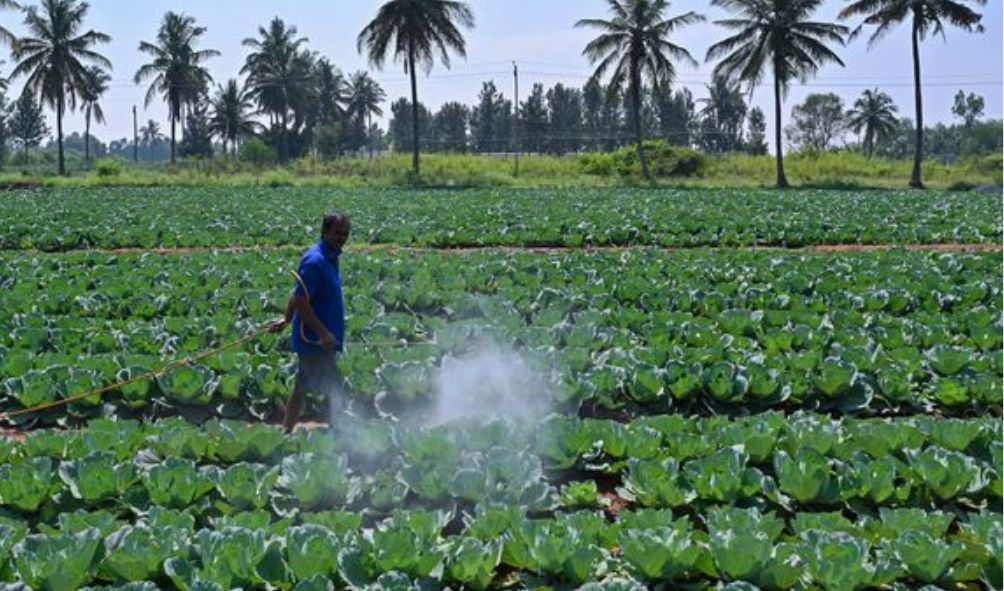Kenyans consuming food containing residues of pesticides banned in Europe

Pesticides banned for use in the European Union due to their risks to health and the environment continue to be sold in Kenya
Pesticides banned for use in the European Union due to their risks to health and the environment continue to be sold in Kenya.
A study released on September 13, 2023, in Kenya, indicates that pesticides that are banned for use in the European Union due to their risks to health and the environment continue to be sold by European and other international companies in Kenya, Human Rights Watch said on Wednesday.
Farmers, horticultural workers, and open-source water users are continually being exposed to toxic pesticides imported into the country.
The study, published by The Route to Food Initiative (RTFI), a program advocating for the right to food in Kenya, says that in 2020 highly hazardous pesticides accounted for over 75 percent of the total pesticide volume in Kenya and nearly half were substances already banned in the EU due to their risks to health and the environment.
The group called on the Kenyan government to urgently put in place regulations on highly hazardous pesticides, prioritizing a list of 40 ingredients identified due to their health and environmental risks and prevalence of use.
“It should go without saying that pesticides considered too harmful for people living in Europe are equally harmful for those living in Kenya,” said Julia Bleckner, senior health researcher at Human Rights Watch.
“The European Union Commission should urgently introduce promised legislation to end the double standard of exporting dangerous pesticides that are already banned for use in the EU.”
Data on Kenya’s pesticide use in 2020 obtained from a private market research company by the RTFI indicates that the Chinese-owned Swiss company Syngenta and German Bayer AG had the largest market share by volume for pesticides in Kenya, together making up 35 percent.
The group also found that over 65 percent of the pesticides sold by Sygenta and nearly 85 percent of those sold by Bayer in Kenya are classified as “highly hazardous” by the Pesticide Action Network, meaning they “are acknowledged to present particularly high levels of acute or chronic hazards to health or environment” under international classification systems.
The report reveals that over half of the 310 pesticides investigated were found to contain, among others, carbosulfan a substance known to damage critical human organs.
Exposure to hazardous pesticides can have severe effects on human rights to health, adequate food, safe drinking water, and to a healthy environment.
According to World Health Organisation (WHO), human exposure to carbosulfan, leads to liver and kidney failure. Additionally, humans also tend to have corroded omental fat layering and peripheral fat, which are key in protecting the inner intestinal linings.
Glyphosate, despite WHO and the UN’s Food and Agricultural Organisation (FAO) giving it a clean bill of health on water contamination, is known to cause cancer in humans, according to 2016 research by the International Agency for Research on Cancer (IARC).
Equally, another toxic substance, carbofuran despite being listed on the Pest Control Products Board’s (PCPB) website as a banned substance (both in Kenya and the US), is still available, the report shows, but labeled differently in Kenya.
The three – carbosulfan, glyphosate, and carbofuran – are the most common in the Kenyan market.
Government limits the sale of US dollars in Kenya by remittance companies
CS Kuria misses yet another key US trade talks
Museveni defiant as US stops Uganda imports under Agoa over anti-LGBTQ law
Inside President Ruto’s State Visit to the US
Defiant expelled ODM MPs meets Ruto at State House
World Bank takes a U-turn, warns Ruto against new taxes
Today, farmers in Kenya are using billions of litres of toxic pesticides in their maize, wheat, coffee, potatoes, and tomato plantation fields, especially in the Rift Valley, Central, Western, and Nyanza regions.
Surprisingly, most of the pesticides easily available over agrovet counters, have been proven to cause cancer or genetic defects, impair fertility, or harm unborn children.
Some of the pesticides sold by these companies in Kenya in 2020 had already been banned in the EU.
The United Nations World Health Organization and the Food and Agriculture Organization developed the criteria for highly hazardous pesticides.
However, because these organizations do not publish official lists of the chemicals meeting these criteria, the Pesticide Action Network regularly publishes an updated list of highly hazardous pesticides.
To ensure strict application of the UN definition, the group uses more specific and stricter criteria.
The danger of highly hazardous pesticides is exacerbated in Kenya, where strategies and resources to minimize the effects of exposure are limited or not feasible.
The location and size of farms mean buffer zones are impractical for limiting pesticide drift or runoff to nearby homes, schools, and waterways.
On July 10, 2023, the Pest Control Products Board introduced new regulations limiting the use of nine active ingredients.
The new regulations include restrictions on the use of four active ingredients included in the 2021 civil society submission: Pymetrozine, Thiacloprid, Chlorothalonil, and Chlorpyrifos, all of which are already restricted or banned for use in the EU.
Kenya’s Pest Control Products Board should expedite and publish the findings of its review of hazardous pesticides initiated in 2020, Human Rights Watch said.
Also read,
IMF pushes Ruto to stop zero-rating of value-added tax (VAT) on goods
128 cases of extrajudicial killings recorded in the first year of Ruto in power, IMLU report
Brace yourself for more pain as the Treasury proposes an increase of VAT tax to 18 percent
Payslip pain for all salaried workers as government mulls withdrawal of tax relief on PAYE
World Bank request for data on Kenyan roads
Follow us




